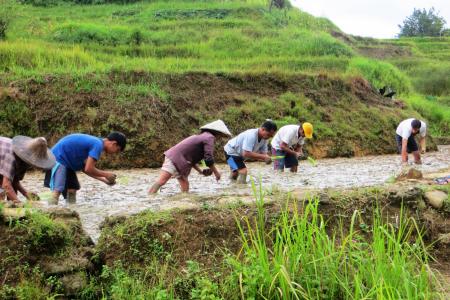Farming is the primary livelihood of the Cordillera interior communities with rice as the main crop. Generally, there are two cropping periods for rice; the cropping during dry months which covers the months of January to June and July to December for the wet months. Unfortunately, not all farmers plant twice a year due to changeable weather conditions. During months, farmers are faced by shortage of water for maintaining irritations while on wet months, rains and typhoons destroy the crop. For every cropping, there is outbreak of pests and diseases attaching the palay all over its growth stage from sowing to ripening of grains. The extent of damage is widespread if not all rice fields are planted because the feeding ground of pests is narrower. The extensive use of inorganic inputs is also eroding the organic farming practices which require cash capital. Farmers are faced by problems thus making it insufferably hard to have good harvest to produce enough food supply for their families.
The pilot trial farm is presently implemented in 3 different sites in Tonglayan, Natonin, Mt. Province. The sites were selected based on different conditions such as altitude, soil condition and cropping history. The CorDisRDS Agriculturist assists the farmer cooperators in pursuing the trial farms. The members of the partner people’s organization also participated in the different activities especially in monitoring and documentation. Training on sustainable agriculture is incorporated in the implementation of the trial farm.
It covers two cropping periods which started in July 2014 and ends in June 2015. The first cropping was completed while the second cropping is nearly ending. The first cropping was successful in terms of planting seedling at younger age, proper spacing of hill, water management and use of organic inputs to enhance soil fertility and control of pests. However, there was no increase in yield due to cold weather and continuous rains towards the productive stage of the palay. This is a challenge face by this effort but majority of the members of our partner peoples organization, Balugang-Daulan Farmers Organization (BaDaFO) concur to adopt and put into practice the learning they acquired from the trial farms. It can be seen in the increased numbers of farmers motivated to apply the farming practices demonstrated in the trial farm for the second cropping.
Two trial farms in Maling, Balbalan, Kalinga started in December 2014 after training on Palay Production Improvement was conducted. The women led the sowing and planting while the land preparation and crop caring was collectively done by the land owners and officers of the partner peoples organization (Maling Community Pappango Organization). The palay are about to be harvested this June 2015 and the community members are eager to see the result if there will be increased in their harvest. Nevertheless, they are convinced that sowing can be done in containers, planting at early age and planting one seedling per hill can produce more tillers. The trial farm also showed water management can reduce the invasion of pests and rice fields are not necessarily flooded for the palay to survive.
The CorDisRDS staff in collaboration with partner peoples organizations are preparing case studies of these trial farms. The documentation of the experiences will be useful in improving appropriate technologies and inputs applicable for palay production base on the situation of the rice fields and the communities. Further it will contribute in the improvement of training module on Palay Production Improvement and intensifying campaign on sustainable agriculture.

